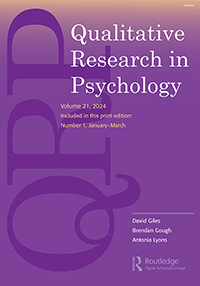Drawing wisdom from the Pacific: A Tongan participative approach to exploring and addressing family violence
IF 4.4
3区 心理学
Q1 PSYCHOLOGY, MULTIDISCIPLINARY
引用次数: 0
Abstract
ABSTRACT The development of qualitative research approaches that are embedded within a Tongan worldview and associated relational practices is pivotal to enhancing knowledge of, and culturally-informed responses to violence within the Tongan kainga (family). We are currently in the early stages of such developments. This reflexive methodological article draws conceptual insights and cultural concepts from the exemplar of a Tongan faith-based family violence prevention programme, which was developed by Tongan community practitioners in Aotearoa New Zealand. We document the adaptation of Tauhi va (nurturing loving and harmonious relationships), Nofo (indigenous cultural immersion), and Talanoa (Pacific indigenous ways of dialogue and discussion) in the design and documenting of this culturally-embedded response to such violence. Elsewhere, we have documented the violence programme in question and its implications for participating families, and the broader faith-based community and leaders. In this article we present a Tongan methodology that we hope is used for other scholar activists also engaged in participative action-oriented research within Tongan and other Indigenous communities more broadly.从太平洋汲取智慧:汤加探索和解决家庭暴力问题的参与式方法
摘要深入汤加世界观和相关关系实践的定性研究方法的发展,对于提高对汤加家庭暴力的认识和文化知情的应对措施至关重要。我们目前正处于这种发展的早期阶段。这篇反思性的方法论文章从汤加基于信仰的家庭暴力预防方案的范例中汲取了概念见解和文化概念,该方案由新西兰奥特亚的汤加社区从业者制定。我们记录了Tauhi-va(培育爱与和谐的关系)、Nofo(土著文化融入)和Talanoa(太平洋土著对话和讨论方式)在设计和记录这种对此类暴力的文化嵌入反应时的改编。在其他地方,我们记录了有关暴力方案及其对参与家庭、更广泛的信仰社区和领导人的影响。在这篇文章中,我们提出了一种汤加方法论,我们希望它能用于其他学者活动家,他们也在汤加和其他土著社区更广泛地从事参与性行动导向的研究。
本文章由计算机程序翻译,如有差异,请以英文原文为准。
求助全文
约1分钟内获得全文
求助全文
来源期刊

Qualitative Research in Psychology
PSYCHOLOGY, MULTIDISCIPLINARY-
CiteScore
20.00
自引率
0.50%
发文量
14
期刊介绍:
Qualitative Research in Psychology is an international, peer-reviewed journal that publishes high-quality, original research. It aims to become the primary forum for qualitative researchers in all areas of psychology, including cognitive, social, developmental, educational, clinical, health, and forensic psychology. The journal also welcomes psychologically relevant qualitative research from other disciplines. It seeks innovative and pioneering work that advances the field of qualitative research in psychology.
The journal has published state-of-the-art debates on various research approaches, methods, and analytic techniques, such as discourse analysis, interpretative phenomenological analysis, visual analyses, and online research. It has also explored the role of qualitative research in fields like psychosocial studies and feminist psychology. Additionally, the journal has provided informative articles on ethics, transcription, interviewee recruitment, and has introduced innovative research techniques like photovoice, autoethnography, template analysis, and psychogeography.
While the predominant audience consists of psychology professionals using qualitative research methods in academic, clinical, or occupational settings, the journal has an interdisciplinary focus. It aims to raise awareness of psychology as a social science that encompasses various qualitative approaches.
In summary, Qualitative Research in Psychology is a leading forum for qualitative researchers in psychology. It publishes cutting-edge research, explores different research approaches and techniques, and encourages interdisciplinary collaboration.
 求助内容:
求助内容: 应助结果提醒方式:
应助结果提醒方式:


